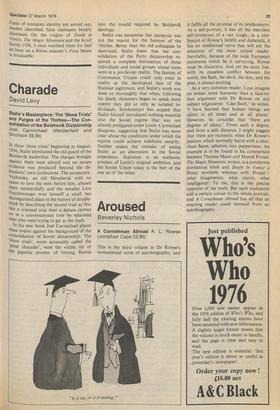Charade
David Levy
Stalin's Masterpiece: The 'Show Trials' and Purges of the Thirties—The Consolidation of the Bolshevik Dictatorship Joel Carmichael (Weidenfeld and Nicolson £6.95) In three 'show trials' beginning in August, 1936, Stalin eliminated the old guard of the Bolshevik leadership. The charges brought against them were absurd and no secure evidence was produced beyond the defendants' own confessions. The prosecutor, Vyshinsky, an old Menshevik with no cause to love the men before him, abused them unmercifully and the novelist Lion reuchtwanger won himself a small but distinguished place in the history of doublethink by describing the second trial as 'less like a criminal trial than a debate carried °II in a conversational tone by educated men who were trying to get at the truth.'
In his new book Joel Carmichael places these events against the background of the consolidation of Soviet dictatorship. The ,show trials', more accurately called the great charades', were the visible tip of the gigantic process of forcing Russia
into the mould required by Bolshevik ideology.
Stalin was paranoiac but paranoia was not the reason for the horrors of the 'thirties. Better than the old colleagues he destroyed, Stalin knew that the consolidation of the Party dictatorship required a complete elimination of those individuals and social groups whose roots were in a pre-Soviet reality. The fantasy of Communist Utopia could only exist in reality as the ideological face of the Stalinist nightmare, and Stalin's work was done so thoroughly that when, following his death, dissenters began to speak more openly they did so only as isolated individuals. Solzhenitsyn has argued that Stalin himself introduced nothing essential into the Soviet regime that was not already prefigured under Lenin. Carmichael disagrees, suggesting that Stalin was more clear about the conditions under which the regime could achieve indefinite security. Neither makes the mistake of seeing Stalin as an aberration in the Soviet experience. Stalinism is an authentic product of Lenin's original ambition, and the Soviet Union today is the heir of the one as of the other. it fulfils all the promise of its predecessors. As a self-portrait, it has all the merciless self-revelation of a van Gogh; as a confession of Rowse's beliefs and disbeliefs, it has an intellectual verve that will stir the attention of the most torpid reader. Inevitably, because of the wide European panorama which he is surveying, Rowse must be discursive. And yet the story line, with its ceaseless conflict between the world, the flesh, the devil, the don, and the poet, is always exciting.
As a very common reader, I can imagine no ordeal more fearsome than a face-toface argument with Dr Rowse on any subject wIlatsoever. 'Like Swift,' he writes, 'I have learned that human beings are idiots in all times and at all places.' However, he concedes that 'there are degrees of idiocy.' From such a degree, and from a safe distance, I might suggest that there are moments when Dr Rowse's passion, which normally burns with a clear, clean flame, splutters into pepperiness. An example is to be found in his comparison between Thomas Mann and Marcel Proust. The Magic Mountain, to him, is a ponderous portentous book and Death In Venice a flimsy novelette whereas with Proust— what imagination, what clarity, what intelligence! To me, this is the precise opposite of the truth. But such explosions add a certain colour to the whole portrait, and A Cornishman Abroad has all that an exacting reader could demand from an autobiography.


































 Previous page
Previous page